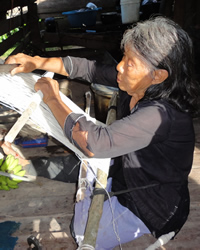The Marinawa lived in isolation until the turn of the 20th century, when rubber barons forced them to migrate to avoid enslavement. Over the next several decades, sickness epidemics decimated roughly 50% of the population.
The Summer Institute of Linguistics (SIL) began working with the Marinawa in the 1950s and completed the New Testament translation in 1997. Since then, at least 2 missionary efforts have had limited to zero success sustaining a church plant among the Marinawa.
While various churches were planted among the Marinawa in the past, only one of them is rumored to continue to meet, and even then only on rare occasions. There are still some scattered believers, but most of them are discouraged and not applying Scripture to their daily lives. However, some families are asking for more Bible instruction.
The Marinawa live in the central jungle region of Peru between the Alto Purús, Curanja, Chandles, and Acre Rivers.
The Marinawa live a daily subsistence lifestyle based on farming, fishing, and hunting. They cultivate both upland and lowland gardens. Crops include manioc, plantains, maize, peanuts, watermelons, papaya, and cotton. Women's roles include farming, cooking, weaving cloth, and making pottery, while men hunt, fish, make canoes, and weave baskets. They also earn income by doing migrant work and selling produce, meat, canoes, and hammocks to merchants.
The Marinawa live in small villages laid out in two parallel lines of houses. Their homes are elevated a few feet above the ground and have thatch roofs and no walls, and they sleep in handwoven hammocks.
The Marinawa hold to animistic views that seek to discover spiritual causes for life problems and resolve them through shamanistic rituals. Shamanism is particularly strong among the Marinawa, where the people view the shaman as a helpful mediator and use plants not only for their medicinal qualities but also for their magical qualities. The Marinawa fear the spirit world, as they believe all spirits are evil and intent on causing harm. Animism presents a strong challenge to church planting, as new believers often mix their previous worldview with Christianity and attempt to live out both realities.
The Marinawa continue to need Bible teaching in their own language. Churches have not been able to sustain themselves over time, and most believers were never discipled. Marinawa believers need leadership training, long-term discipleship, self-sustaining churches, and concrete life changes informed by Scripture.
The Marinawa also need better health care, access to clean water, improved education, and business opportunities to help them navigate Westernization and a changing environment.
Please pray for the Marinawa believers to be encouraged and continue pursuing the Lord.
Pray that God will raise up Marinawa leaders who can plant healthy sustainable churches.
Pray for the Marinawa to apply biblical teachings to their daily lives.
Pray for the Marinawa's physical and socio-economic needs, such as health, education, and economic development.
Scripture Prayers for the Sharanahua in Peru.
| Profile Source: Pioneers |











